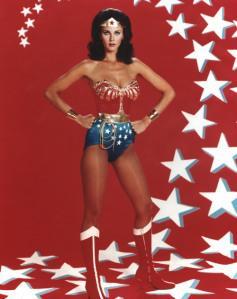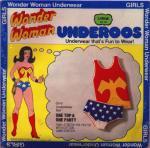
The Wonder Woman series had a few false starts before the 1975 TV movie, which spawned the well-remembered Lynda Carter series. Even when it finally got off the ground, the show — full title, The New Adventures of Wonder Woman — only lasted one season before it was retooled and moved to another network (CBS).
In recent years, other attempts at bringing the DC Comics property to the small screen have failed as well, including one led by Joss Whedon. You could hardly escape last year’s debate about Adrianne Palicki’s pants. Why is bringing the Amazonian princess to life such a challenge? And what did the 1970s series get right that so many others missed?
The movie-length pilot takes us right into the era of the comic book, opening with a newsreel about the Nazi occupation. The bright, brash opening sequence features pointillist comic book panels and a theme song that promises patriotism and ass-kicking.
But then the tone quickly moves from color and excitement to something more grave. Inside a Nazi headquarters, a general gives orders to bomb a factory in a Brooklyn shipyard, a blow that will set the Allied war effort back by a year. Stateside, Major Steve Trevor (Lyle Waggoner) and his military colleagues learn of this plan and plot to stop it without alarming the public. His buxom blonde assistant, Marsha, does her share of hand-wringing. American morale is their top priority.
Think for a moment about this time period. It’s the mid-1970s. The American pride that accompanied victory in WWII and the ensuing prosperity had been displaced by cynicism about Vietnam and Watergate. In stark contrast to Smallville (the most enduring show in recent memory based on DC characters), made for a teen adult audience, this show was clearly targeting adults, i.e. the people who grew up reading the comics. There was probably a need for some good old, American patriotism and harkening back to the says of clearly delineated good- and bad-guys. When the Americans eventually meet the woman they call wonder, they explain the war to her as a simple matter of good fighting evil.
Trevor flies toward the Bermuda Triangle to intercept the German pilots bound to bomb the shipyard. He is shot down in what may be the worst use of special effects ever seen and washes up on a beach. Here we finally meet Princess Diana, frolicking with one of her Amazonian sisters. It’s awful. Where did women on a remote island get little nighties that look like they came out of the Sears catalog? Paradise Island is a weird mash-up of ancient Greek culture and technology, true to the comic, but nonsensical anywhere else. To get through the island scenes you really have to suspend your disbelief. Or just get distracted by boobs and then you won’t think too hard. They find Trevor unconscious on the beach and, blindfolding him so that he won’t know his location, they bring him back to the palace.
Cloris Leachman plays a striking queen, Diana’s mother. She decrees an Olympics-style tournament among the women to decide who will return Trevor to the U.S. Diana’s mother forbids her to participate, so Diana wears a disguise and wins. The tournament gives the creators a chance to showcase the Amazonians’ abilities and Diana’s determination. Her mother rewards her with a special suit, conveniently in American red white and blue, and sends her off in the invisible jet to see Trevor home.
There are faint glimmers of romance between Diana and Trevor, as she poses as a nurse and gets him medical help. Diana attempts to blend in to society but, naturally, stands out in a crowd. Because she comes from a sheltered background, it never occurs to her that anyone might underestimate her based on her gender; this naivete allows for some brief exploration of feminist ideas. There’s no doubt Wonder Woman gets attention for her voluptuous proportions, but her brains and skills are what bring her success.
As the plot proceeds with the battle of Allies vs. Axis, it boils down to a battle of woman vs. woman. Marsha is actually a Nazi spy and so Wonder Woman is forced to kick her butt. Thus the day is saved and the American public goes on unaware. The overarching war story plot moves at a pace that must be what the world looks like to The Flash. What holds the whole TV movie together is the charisma of Lynda Carter. She embodies the boldness of Wonder Woman while remaining beautiful and charming. She commands attention every moment she is on screen. It’s a given that a generation of girls growing up in the 70s wanted to be her, making stuff like this sell like hotcakes:

Super70s.com has some more dirt on the background of this show.
And remember, Wonder Woman fans, we’ll meet her again soon, on May 4, 2012.
